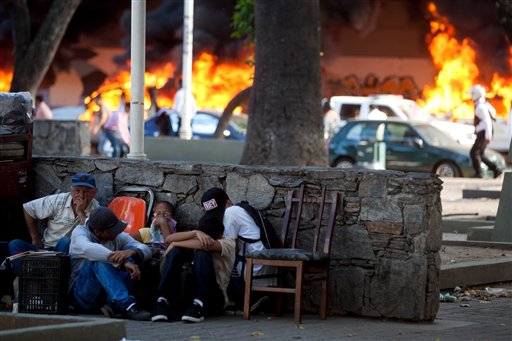Venezuela opposition fears crackdown after protest

Bystanders take cover from the violence on the street after clashes broke out between opposition protesters with security forces and pro-government supporters during a protest against the government in Caracas, Venezuela, Wednesday, Feb. 12, 2014. AP.
CARACAS, Venezuela—Members of Venezuela’s opposition warned of a coming government crackdown after authorities tried to search the offices of a political party and blamed a hard-line leader for inciting violence that led to three deaths during anti-government protests.
A day after more than 10,000 people marched against President Nicolas Maduro’s 10-month-old government, a swirl of rumors hung over much of Caracas on Thursday.
A group of about 200 students occupied the city’s main highway for two hours before re-joining a larger, peaceful protest in the city’s wealthy eastern district to demand justice for a 24-year-old anti-government demonstrator who was killed Wednesday by a bullet. Demonstrations also took place in several cities around the country.
Meanwhile, local newspaper El Universal published what it said was a leaked copy of an arrest order for Leopoldo Lopez, the Harvard-trained former mayor who has been spearheading the wave of protests around the nation in recent weeks, on charges including conspiracy, murder and terrorism.
Chief federal prosecutor Luisa Ortega didn’t mention an arrest order for Lopez in two statements to the press Thursday. But several Cabinet officials denounced him as the mastermind of what they called a “fascist” United States-backed strategy to replicate the unrest that preceded the 2002 coup that briefly removed President Hugo Chavez from power.
Article continues after this advertisementLopez himself hasn’t been heard from since a Wednesday night press conference in which he vowed to remain in the streets to channel rising popular frustration with 56 percent inflation, rampant crime and an assault on political freedoms.
Article continues after this advertisementAllies denied that Lopez was backing down in the face of what they warned is an expected government crackdown, saying that he’s consulting with aides to determine whether his arrest is being sought.
Lawyers for his Popular Will party turned back a group of armed military intelligence officers who tried to search their headquarters without a warrant. Pro-government lawmakers also vowed to strip congresswoman Maria Corina Machado, another fiery government critic, of her parliamentary immunity from prosecution.
Human rights groups warned the government is abusing its authority and trying to intimidate opponents while blocking local and international media from reporting. In Washington, a State Department official urged Maduro’s government live up to its international obligations to protect freedoms of expression and Venezuelans’ right to peaceful assembly.
“What Venezuela urgently needs is for these killings to be investigated and the killers brought to justice, no matter their political affiliation,” Jose Miguel Vivanco, Americas director for Human Rights Watch, said in a statement. “What Venezuela does not need is authorities scapegoating political opponents or shutting down news outlets whose coverage they don’t like.”
The international criticism showed no sign of deterring Maduro, who warned he’d severely punish anyone found conspiring against his socialist government.
He also lashed out at the international media, saying that France’s AFP news agency was at the front of a campaign of “manipulation” that also included Colombia’s NTN24, which the government pulled from the airwaves during its live transmission of the unrest.
“Nobody is going to come from abroad to pressure or disturb us,” he said during a televised address Thursday night, during which residents could be heard banging on pots of pans in protest in several parts of the city.
Nationwide, authorities said 66 people had been seriously wounded during the past two days, including 17 members of security forces, and another 69 detained.
Lopez’s allies blamed the violence on the government, charging that security forces acting on the president’s orders stood by Wednesday while pro-government militia members roared up on motorcycles and attacked the small group of student protesters that lingered downtown after the biggest-ever rally against Maduro disbanded peacefully.
Lopez is the leader of a splinter faction of the opposition alliance challenging what it considers the meek leadership of two-time presidential candidate Henrique Capriles.
“We chose this path which could be long but it’s safe,” Capriles said in comments Thursday in which he condemned the government’s strong-armed tactics but also distanced himself from those within his own camp trying to stir violence.
Analysts also questioned whether Lopez’s strategy, known as “The Exit,” for the hashtag used on social media to mobilize the more than 10,000 people who turned out for Wednesday’s protest, could end up strengthening Maduro’s hand and undermine two years of hard-fought electoral gains by the opposition.
While Venezuela’s economy is sinking deeper every day, the moment hasn’t arrived for a Ukraine-like standoff on the streets, said Carlos Romero, a political analyst at the Central University of Venezuela.
Maduro has done a skillful job ensuring the loyalty of the military, traditionally the arbiter of political disputes in Venezuela, and foreign governments are hesitant to exert too much pressure on the president, Romero said.
At the same time, after a string of exhausting elections following Chavez’s death last March, most Venezuelans are focused on the more immediate task of putting food on the table amid record shortages, 56 percent inflation and a weakening currency.
“The Venezuelan people want peace and stability right now, not political war,” said Romero, who is an adviser to the opposition alliance. “The middle class that took to the streets are the same ones who’ve always supported the opposition. They aren’t the ones who will deliver regime change.”
RELATED STORIES
Venezuela’s president blames telenovelas for crime